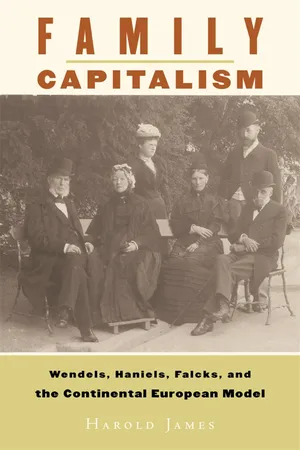
Family Capitalism
Wendels, Haniels, Falcks, and the Continental European Model
- English
- PDF
- Available on iOS & Android
About this book
This history of three powerful family firms located in different European countries takes place over a period of more than two hundred years. The interplay and the changing social and legal arrangements of the families shaped the development of a European capitalism quite different from the Anglo-American variety.
Qualifying claims by Alfred Chandler and David Landes that family firms tend to be dysfunctional, Harold James shows how and why these steel and engineering firms were successful over long periods of time. Indeed, he sees the family enterprise as particularly conducive to managing risk during periods of upheaval and uncertainty when both states and markets are disturbed. He also identifies the key roles played by women executives during such times.
In Family Capitalism, James tells how "iron masters" of a classical industrial cast were succeeded by new generations who wanted to shift to information-age systems technologies, and how families and firms wrestled with social and economic changes that occasionally tore them apart. Finally, the author shows how the trajectories of the firms were influenced by political, military, economic, and social events and how these firms illuminate a European model of "relationship capitalism."
Frequently asked questions
- Essential is ideal for learners and professionals who enjoy exploring a wide range of subjects. Access the Essential Library with 800,000+ trusted titles and best-sellers across business, personal growth, and the humanities. Includes unlimited reading time and Standard Read Aloud voice.
- Complete: Perfect for advanced learners and researchers needing full, unrestricted access. Unlock 1.4M+ books across hundreds of subjects, including academic and specialized titles. The Complete Plan also includes advanced features like Premium Read Aloud and Research Assistant.
Please note we cannot support devices running on iOS 13 and Android 7 or earlier. Learn more about using the app.
Information
Table of contents
- Contents
- Figures
- Maps
- Abbreviation
- Introduction: The Familiarity of Capitalism
- Part I. The Age of the Individual
- Part II. The Age of the Corporation
- Part III. The Age of Organizationalism
- Part IV. The Age of the Postwar Miracle
- Part V. The Age of Globalization
- Conclusion: Family Entrepreneurship
- Appendix: Family Trees
- Notes
- Acknowledgments
- Index